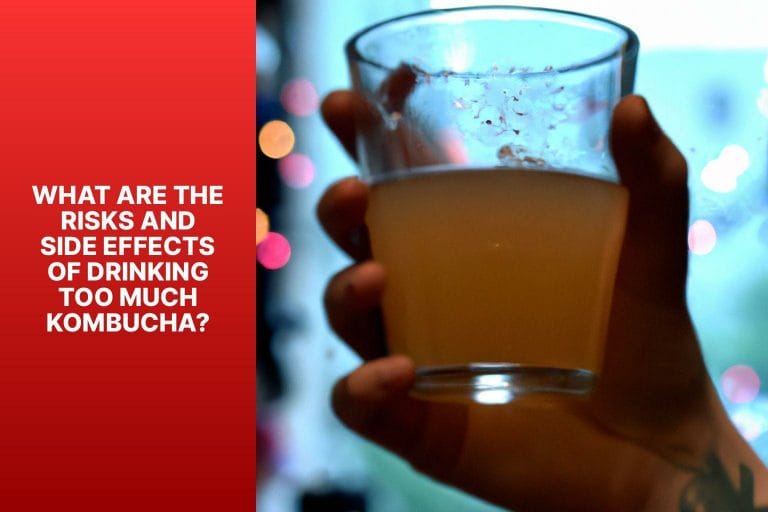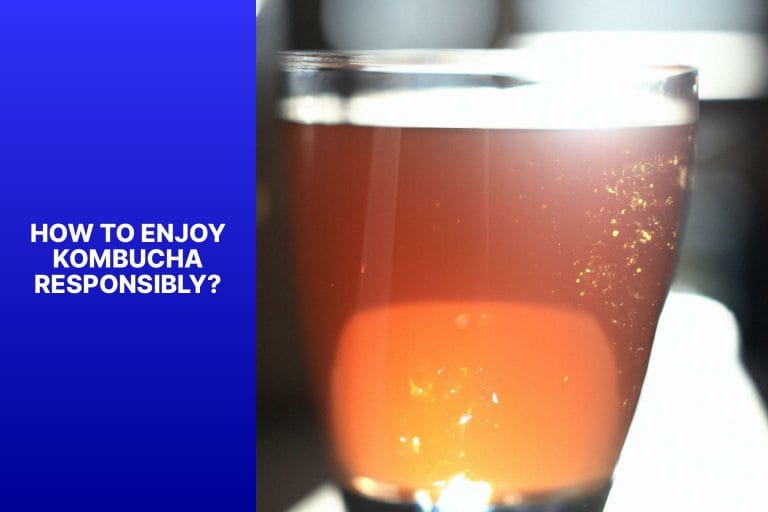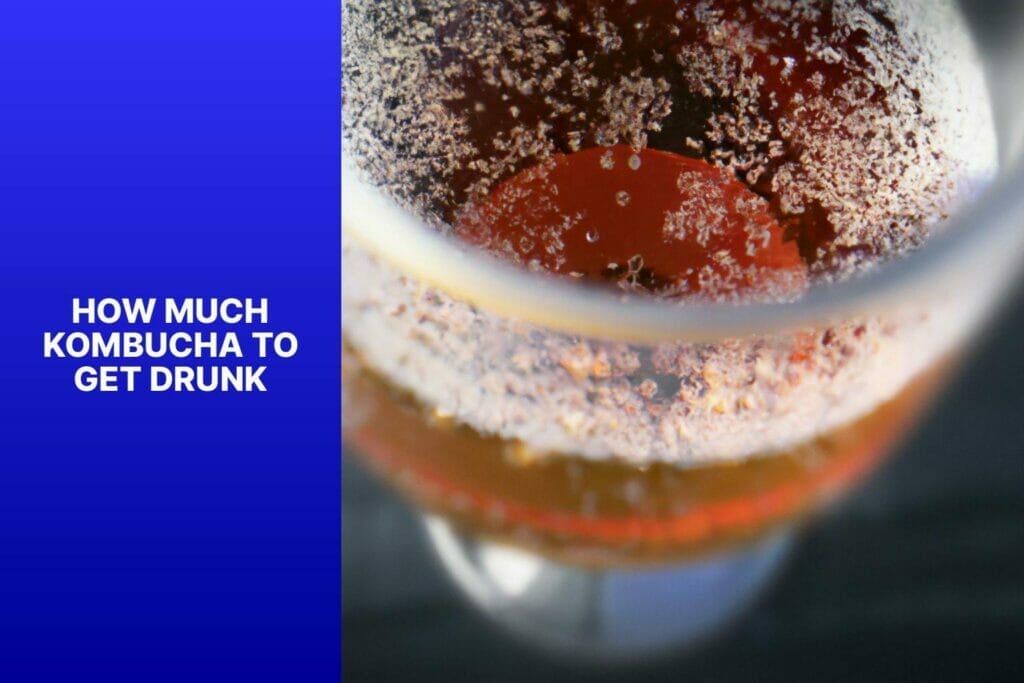Kombucha has recently gained popularity for its potential health benefits and refreshing taste.
Made from fermented tea with the help of a SCOBY (symbiotic culture of bacteria and yeast), Kombucha is a fizzy and tangy beverage believed to have probiotic properties.
It is typically consumed as a nonalcoholic drink, but there is a common question about its alcohol content and whether it can lead to intoxication.
To understand the relationship between Kombucha and alcohol, it is important to delve into the factors that affect the alcohol content in Kombucha.
These include the fermentation time, sugar content, temperature, and type of yeast used during fermentation. The alcohol content in Kombucha can vary between homemade and store-bought varieties.
While Kombucha naturally contains minimal alcohol due to the fermentation process, the alcohol content is usually low.
Commercially available Kombucha must adhere to legal limits for alcohol content, typically less than 0.5% ABV (alcohol by volume).
Homemade Kombucha may have a higher alcohol content, especially if fermentation is not monitored properly.
Considering these factors, it is highly unlikely to get drunk from drinking Kombucha alone. The alcohol content is typically too low to cause intoxication.
Excessive consumption can still have risks and side effects. These may include alcohol intoxication, digestive issues, allergic reactions, and medication interference.
To enjoy Kombucha responsibly, it is recommended to consume it in moderation and be mindful of the alcohol content.
Understanding the alcohol limits in store-bought Kombucha and being cautious with homemade varieties can help ensure a safe and enjoyable experience.
Key takeaway:
- Kombucha is a fermented tea drink that contains a small amount of alcohol, but it is unlikely to get you drunk.
- The alcohol content in kombucha can vary and is influenced by factors such as fermentation time and temperature.
- Commercially sold kombucha usually adheres to legal limits for alcohol content, typically less than 0.5% ABV.
What is Kombucha?
Kombucha is a fermented tea, sugar, bacteria, and yeast drink. During fermentation, the bacteria and yeast consume sugar, producing ethanol and carbon dioxide.
The carbon dioxide creates the fizzy nature of kombucha, while the ethanol content is typically very low, around 0.5% or less.
Kombucha is often touted for its health benefits, claiming to have probiotics and antioxidants. Scientific evidence supporting these claims is limited, and further research is needed to understand its potential effects on human health.
Kombucha is believed to have originated in northeast China around 200 BCE and was known as “the tea of immortality.”
It has since spread to other parts of Asia, including Russia and Japan, and gained popularity in Europe and North America.
Each culture and region has added ists to the brewing process, resulting in various flavors and styles of kombucha available today.
Can You Get Drunk from Kombucha?
Can you get drunk from drinking kombucha? Let’s uncover the truth by exploring the factors affecting alcohol content in this popular fermented beverage.
From fermentation time to brewing techniques, we’ll delve into the secrets behind kombucha’s potential intoxicating effects.
So, buckle up and discover the surprising facts that contribute to the alcohol content in kombucha.
Factors that Affect Alcohol Content in Kombucha
Several factors influence the alcohol content in kombucha. These factors and their descriptions are as follows:
– Fermentation Time: The duration of fermentation directly impacts the alcohol content. Normally, fermentation takes 7-14 days, but a longer fermentation period can increase the level of alcohol.
– Temperature: The temperature at which fermentation occurs plays a role in alcohol production. Higher temperatures speed up fermentation and result in higher alcohol levels, whereas lower temperatures slow fermentation and lower alcohol levels.
– Sugar Content: Sugar is necessary for fermentation. Increasing the amount of sugar used can lead to higher alcohol production, although most sugar is consumed during fermentation.
– Type of Yeast: Different strains of yeast have varying abilities to convert sugar into alcohol. Some yeast strains can produce more alcohol than others.
– Air Exposure: The amount of exposure to oxygen during fermentation affects the chances of alcohol formation. Properly sealed containers minimize alcohol production.
If you want to reduce the alcohol content in your kombucha, you can try shorter fermentation times, lower temperatures, and minimizing air exposure.
Always be aware of the alcohol content if you have concerns regarding alcohol consumption.
How Much Alcohol is in Kombucha?
Are you curious about the alcohol content in kombucha? Delve into the world of fermented teas as we explore the levels of alcohol found in this popular beverage.
Discover the legal limits for alcohol content in kombucha and uncover the differences between homemade and store-bought varieties. Learn fascinating facts and stay informed about the buzz surrounding kombucha’s alcohol content.
Legal Limits for Alcohol Content in Kombucha
The legal limits for alcohol content in kombucha vary by country and can impact its sale and distribution. Below is a table showing the legal limits in different regions:
| Region | Legal Limit for Alcohol Content in Kombucha |
|---|---|
| United States | 0.5% ABV |
| European Union | 1.2% ABV |
| Canada | 1.1% ABV |
| Australia and New Zealand | 1.15% ABV |
These limits ensure that kombucha is classified as a nonalcoholic beverage.
Kombucha exceeding the legal limit may face additional regulations and be considered an alcoholic beverage, requiring proper labeling and licensing.
To meet these limits, kombucha manufacturers closely monitor the fermentation process and alcohol content at different stages.
Homemade kombucha may not be easily regulated, so caution must be taken at home.
When buying store-bought kombucha, check the label to ensure it complies with the legal limits in your region.
Enjoying kombucha responsibly means being aware of its alcohol content and consuming it in moderation.
Understanding the legal limits for alcohol content in kombucha helps consumers make informed choices and ensures product safety and compliance.
Alcohol Content in Homemade vs. Store-Bought Kombucha
The alcohol content in homemade kombucha is generally lower than in store-bought kombucha. This is because homemade kombucha is fermented for a shorter time and has less control over the fermentation process.
On the other hand, store-bought kombucha is produced on a larger scale with more precise control over fermentation.
To show the difference in alcohol content between homemade and store-bought kombucha, consider the following table:
| Homemade Kombucha | Store-Bought Kombucha | |
| Alcohol Content in Homemade vs. Store-Bought Kombucha | 0.5-1% | Less than 0.5% |
| Fermentation Period | Approximately 7-14 days | Usually longer and more consistent |
| Control | Less precise control over fermentation | More precise control over fermentation |
It’s important to note that homemade kombucha falls within the legal limits for nonalcoholic beverages, despite having a slightly higher alcohol content.
If you want to avoid alcohol entirely, it may be safer to choose store-bought kombucha, which typically has an alcohol content of less than 0.5%.
Choosing between homemade and store-bought kombucha depends on personal preference and your comfort level with alcohol content.
How Much Kombucha Should You Drink to Get Drunk?
When consuming kombucha to get intoxicated, it’s crucial to acknowledge that the alcohol content is typically low, usually ranging from 0.5% to 3% ABV.
It’s worth noting that the production process meticulously limits the alcohol content to insufficient levels to induce a sense of intoxication.
Several factors influence the alcohol content, including the duration of fermentation, the specific type of yeast employed, and the environmental conditions prevalent during fermentation.
In the United States, kombucha is classified as nonalcoholic if it contains less than 0.5% ABV. Kombucha brands strictly adhere to this threshold to ensure compliance with regulations.
For an average person to experience mild intoxication, much kombucha must be consumed. Individual alcohol tolerance varies based on body weight, metabolism, and sensitivity to alcohol.
While kombucha can offer health benefits when consumed in moderation, it is imperative to be mindful of your alcohol consumption.
If you are seeking a strong intoxicated effect, it is advisable to opt for other alcoholic beverages with higher alcohol content.
Fact: The modest alcohol content in kombucha is a byproduct of the fermentation process. This process converts sugars into alcohol and carbon dioxide, essential for developing probiotics and kombucha’s distinctive flavors.
What Are the Risks and Side Effects of Drinking Too Much Kombucha?

Photo Credits: Standardkombucha.Com by Scott Roberts
Curious about the risks and side effects of guzzling down kombucha?
Let’s delve into the dangers that come with excessive consumption.
From alcohol intoxication to digestive issues, allergic reactions, and potential medication interference, we’ll explore the not-so-pleasant outcomes of going overboard with this trendy fermented beverage.
Buckle up for some eye-opening insights into how much kombucha is too much!
1. Alcohol Intoxication
Alcohol intoxication can occur if you consume an excessive amount of kombucha. It is crucial to be aware of the risks and consequences of alcohol intoxication to drink responsibly.
Impaired coordination is one of the effects of alcohol intoxication, making it challenging to walk, talk, and perform tasks.
Slurred speech is another symptom of consuming too much alcohol, making it difficult to communicate clearly. Poor judgment is also a result of alcohol intoxication, leading to risky behavior or bad choices.
Consuming excessive kombucha can cause nausea and vomiting due to alcohol irritating the stomach. Drinking excessive alcohol can lead to headaches and dizziness, negatively impacting overall well-being.
A real-life example of alcohol intoxication involves John, who consumed multiple bottles of homemade kombucha at a party.
He experienced impaired coordination, slurred speech, and poor judgment throughout the night. His friends became concerned and called for medical assistance.
This incident taught John the importance of drinking responsibly and being aware of the alcohol content in kombucha.
2. Digestive Issues
- Consuming kombucha can lead to digestive issues in some individuals.
- Stomach discomfort is a common problem associated with the consumption of kombucha.
- Some people may experience bloating or gas after they drink kombucha.
- Digestive issues can manifest as either diarrhea or constipation in certain cases.
- The high acidity of kombucha can potentially irritate the stomach lining, thus causing these issues.
- Individuals with digestive conditions such as acid reflux or irritable bowel syndrome may be more susceptible to experiencing digestive issues from consuming kombucha.
- If you notice any negative digestive effects, it is crucial to discontinue the consumption of kombucha.
- To lessen the risk of digestive issues, it is advisable to consume kombucha in moderation and gradually increase the amount consumed.
- For individuals with specific digestive concerns, seeking guidance from a healthcare professional can help determine if kombucha is appropriate.
3. Allergic Reactions
- Kombucha can cause allergic reactions in some individuals.
- The fermentation process and the presence of certain substances in kombucha, such as yeast and bacteria, cause these reactions.
- Symptoms of allergic reactions may include skin rashes, itching, hives, swelling, difficulty breathing, and gastrointestinal issues.
- Individuals with known allergies to yeast or mold may be more prone to experiencing allergic reactions to kombucha.
- If you have allergic symptoms after consuming kombucha, seek medical attention to determine the cause and receive appropriate treatment.
Kombucha originated in ancient China over 2,000 years ago. It was known as the “Tea of Immortality” and valued for its potential health benefits.
Kombucha is made by fermenting sweetened tea with a symbiotic colony of bacteria and yeast (SCOBY). It has gained worldwide popularity for its probiotic properties and unique flavor.
Be aware of the potential for allergic reactions to kombucha, especially if you have a history of allergies to yeast or mold.
Always consult a healthcare professional if you have concerns or experience adverse reactions.
4. Interference with Medications
Interference with medications is a significant concern when consuming kombucha. Here are some important points to keep in mind regarding this issue:
1. Kombucha is known to contain organic acids and antioxidants, which can potentially impact the metabolism of medications.
2. Certain medications, such as anticoagulants or blood thinners, may be influenced by kombucha. The organic acids present in kombucha can potentially increase the risk of bleeding.
3. It is possible for kombucha to interfere with medications that are processed in the liver. The antioxidants found in kombucha can affect the enzymes responsible for metabolizing specific medications. This can result in higher levels of the drugs in the body.
4. To ensure your safety, it is crucial to consult with your healthcare provider before consuming kombucha if you are taking any medications. They can offer guidance specific to your medical condition and the medications you are currently using.
To enjoy kombucha responsibly and minimize the risk of medication interference, consider the following steps:
1. Inform your doctor about your kombucha consumption and any other supplements or alternative therapies you may use.
2. Pay close attention to any potential side effects or adverse reactions while consuming kombucha, particularly if you have recently started taking new medications.
3. If you have concerns about possible interactions between kombucha and your medications, it may be wise to reduce or avoid kombucha until you have had the opportunity to discuss this with your healthcare provider.
How to Enjoy Kombucha Responsibly?

Photo Credits: Standardkombucha.Com by Henry King
When enjoying kombucha responsibly, it is crucial to follow a few steps. Here’s a guide on how to enjoy kombucha responsibly:
- Start gradually: If you’re new to kombucha, it’s best, to begin with half a cup to see how it suits you.
- Know the alcohol content: Typically, kombucha contains less than 0.5% alcohol. Nevertheless, some brands might have higher levels, so it’s essential to check the label for alcohol content.
- Understand your limits: Keep in mind that kombucha affects individuals differently. If you experience any adverse effects, it’s wise to stop consuming it.
- Stay hydrated: Alongside drinking kombucha, drink enough water to maintain a proper balance.
- Enjoy the taste: Take the time to appreciate kombucha’s flavors and unique qualities beyond its alcohol content.
- Share the experience: Consider drinking kombucha with friends or family to create a responsible and enjoyable atmosphere.
A real-life story underlines the significance of enjoying kombucha responsibly. A group of friends organized a kombucha-tasting party where they followed these steps.
This allowed them to have a fun and responsible experience while they learned about different kombucha brands and enjoyed each other’s company.
Knowing how to enjoy kombucha responsibly can greatly contribute to a safe and enjoyable experience.
Some Facts About How Much Kombucha to Get Drunk:
- ✅ Kombucha typically contains less than 1 percent alcohol by volume. (Source: Mashed)
- ✅ Drinking a bottle of kombucha is unlikely to get you drunk or even buzzed. (Source: Mashed)
- ✅ In 2015, kombucha producers were informed that their products tested over the 0.05 percent alcohol-by-volume level allowed for nonalcoholic beverages. (Source: Mashed)
- ✅ Homemade kombucha can have higher alcohol content, ranging from 0.5% to 3% ABV. (Source: Brewbuch)
- ✅ To feel the same effects as drinking one beer, consume ten times the amount of kombucha. (Source: Brewbuch)
